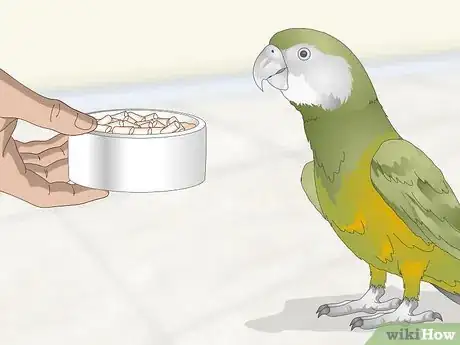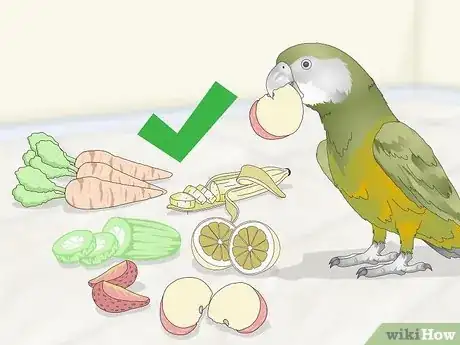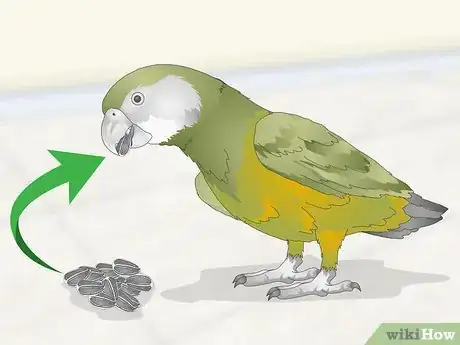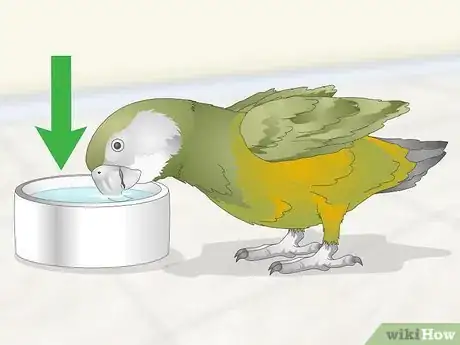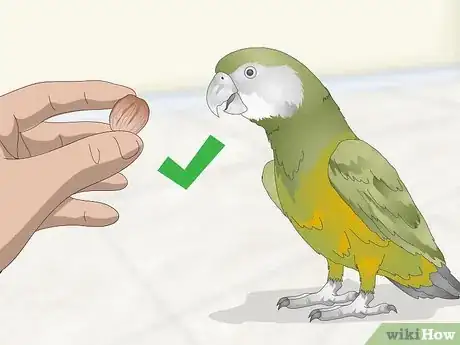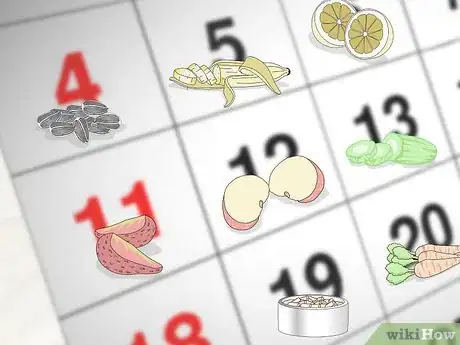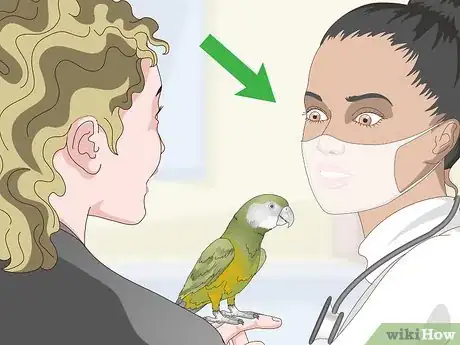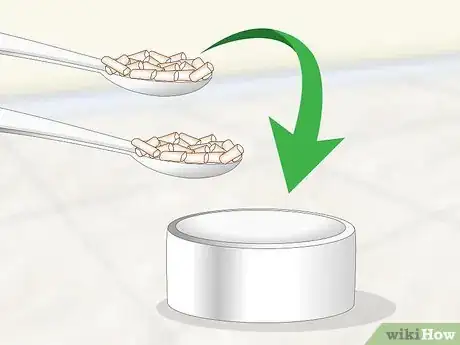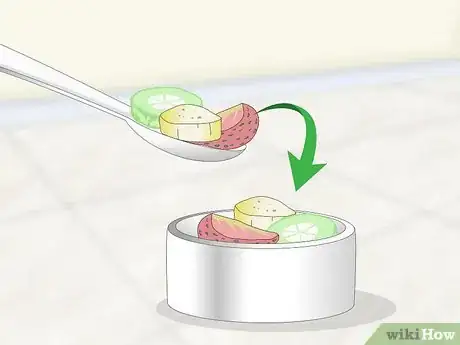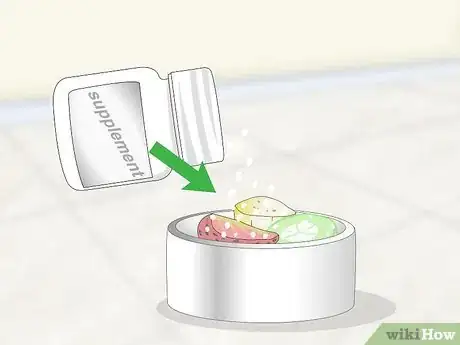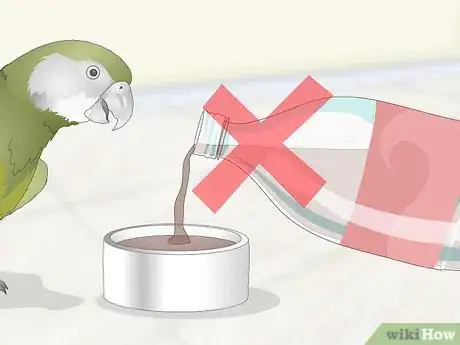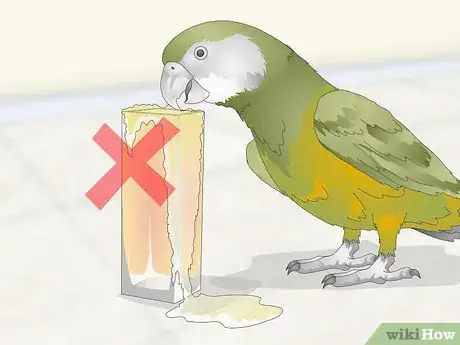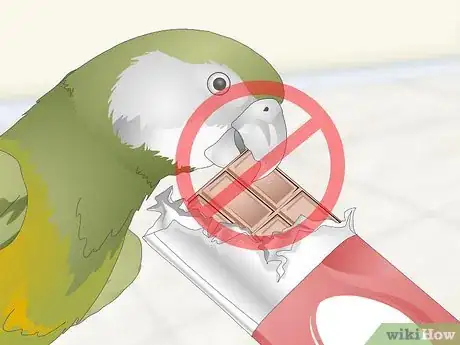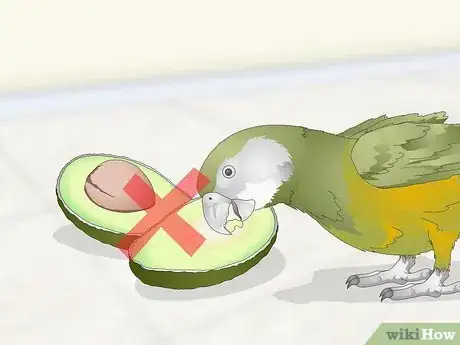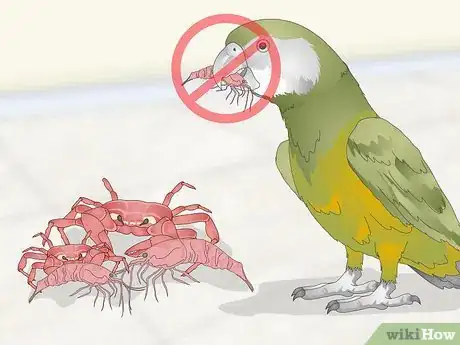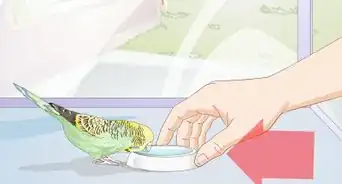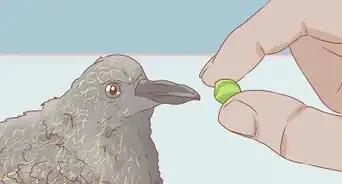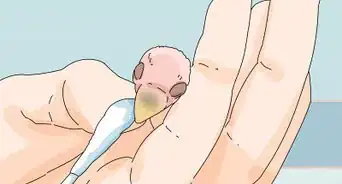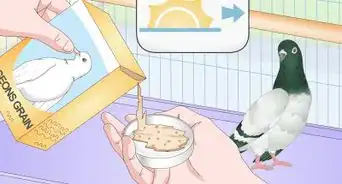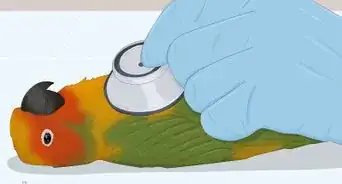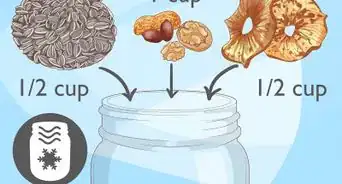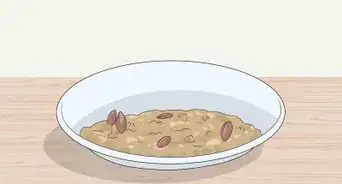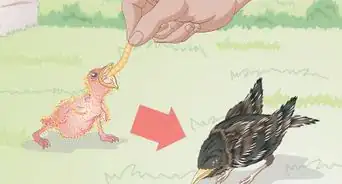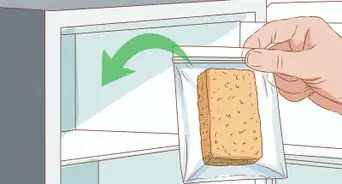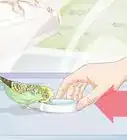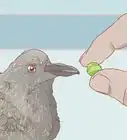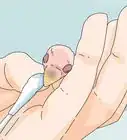This article was co-authored by Pippa Elliott, MRCVS. Dr. Elliott, BVMS, MRCVS is a veterinarian with over 30 years of experience in veterinary surgery and companion animal practice. She graduated from the University of Glasgow in 1987 with a degree in veterinary medicine and surgery. She has worked at the same animal clinic in her hometown for over 20 years.
This article has been viewed 18,425 times.
Feeding your Senegal parrot is a crucial for keeping it healthy. Feed your Senegal parrot a diet of mostly pelleted food and fresh produce. Offer some seeds and snacks, too. Providing your Senegal parrot with a variety of foods will ensure it eats a balanced diet. Finally, don't forget to offer your pet clean water each day.
Steps
Choosing Food
-
1Provide your bird with food pellets. Pellets should be the primary source of your bird’s nutritional profile. Pelleted diets can be purchased at your local pet store and are tailored to the different life stages of your Senegal parrot.[1]
- For instance, some pellet formulations might be designed for parrots three years old or older. Others might be designed for Senegal parrots over a certain weight, or parrots who are laying eggs.
- Check the label on each parrot pellet package before purchasing.
- Obtain organic pellets whenever possible.[2]
-
2Offer your bird fruits and vegetables. Before serving your Senegal parrot fruits or veggies, wash them thoroughly and chop them into small chunks. Some of Senegal parrots’ favorite fruits and vegetables include:[3]
- apples
- pitted cherries
- cucumbers
- strawberries
- carrots
- oranges
- bananas
Advertisement -
3Give your bird seeds. Senegal parrots love eating a variety of seeds, but tend to favor peanut and sunflower seeds. Because peanut and sunflower seeds are high in fat, seeds should be the smallest part of your Senegal parrot’s diet and compose no more than 5% of its overall caloric intake.[4]
- Seed diets should not be your parrot’s only source of food.
- Purchase sprouted seeds for your parrot whenever possible. Sprouted seeds are healthier and have higher nutritional content.[5]
-
4Make water available. Keep a bowl of fresh, clean water available at all times. If your tap water has salt or substantial mineral content in it, your bird might dislike it. In that case, give your bird distilled water instead.[6]
-
5Give your bird some snacks. In addition to food provided for sustenance and nutrition, your bird will surely enjoy the occasional hand-fed snack. A couple of walnuts or almonds make a great snack, but don’t feed your pet more than a couple because nuts have a high fat content. Your Senegal parrot might also appreciate dried fruit bits (raisins, banana chips, and dried cranberries), soy beans, and a handful of oat groats.[7]
- Small pieces of meat, cheese, or fish are acceptable in moderation.
-
6Offer your bird a variety of foods. Like people, Senegal parrots will grow tired of eating the same thing every day. Instead, offer them different foods each day. Doing so will help them maintain their interest in the dining experience and provide them with all the vitamins and minerals they need.[8]
- Additionally, don’t assume that just because a Senegal turns down a particular food one day that you should never offer it again. Sometimes your bird simply doesn’t eat a particular food because it is already full.
-
7Talk to your vet. Only your vet has the expertise and knowledge necessary to know what’s best for your Senegal parrot. During your regularly scheduled checkups, your vet will ask about your bird’s nutrition and eating habits. Alert your vet to any changes in its eating habits or in your feeding schedule. Your vet will be able to guide you through all the necessary nutritional issues pertaining to your Senegal parrot.[9]
Creating a Feeding Schedule
-
1Feed your parrot 1-2 heaping tablespoons of pellets daily. A heaping tablespoon or two will provide your Senegal parrot with all the pellets it needs for the day. You can offer these pellets in the morning and allow your parrot to nibble on them throughout the day. Pellets should make up 80 percent of your parrot's diet.
- If you have more than one parrot, add an appropriate amount of pelleted food per bird.
-
2Provide 1-2 heaping tablespoons of fruit and vegetables daily. In addition to pellets, your Senegal parrot needs some fresh produce. Fruits and vegetables should make up 20 percent of your parrot's diet. The fruits and vegetables you provide should vary. Fresh produce will make your parrot’s dining experience more enjoyable and add important vitamins and minerals.
-
3Add supplements if necessary. Your bird should not need grit, gravel, or dietary supplements added to its meals. However, if your vet suggests that your bird does need such supplements, they will recommend an appropriate one and inform you of how often you need to administer it.
- Your vet will also tell you how much of the supplement you need to give your pet bird.
- Typically, supplements are in powdered form and simply sprinkled on fruit or vegetables. However, read supplement instructions carefully and refer questions to your vet.
Avoiding Hazards
-
1Do not feed your parrot caffeinated beverages. Caffeine an cause your Senegal parrot’s heart rate to increase, which could lead to hyperventilation. Hyperventilation, in turn, could cause your bird to have seizures and die.
-
2Don’t permit your bird to drink alcohol. Alcohol, even in small amounts, can quickly lead to alcohol poisoning in Senegal parrots. To avoid this unhappy fate, don’t serve your pet alcohol, and remove alcohol from any space where your bird flies or plays.
-
3Don’t let your bird eat chocolate. Chocolate contains chemical compounds that can cause your Senegal parrot to develop heart problems, depression, liver damage, and seizures. To keep your parrot healthy, keep chocolate away from it.
-
4Don’t feed your bird avocado. Avocado contains an oil that leaches a toxin into the fruit. Keep avocado and guacamole away from your Senegal parrot to protect it.
-
5Keep shellfish away from your Senegal parrot. Shellfish can be toxic to Senegal parrots. Don’t feed your parrot shellfish, including shrimp, lobster, crab, or crayfish.
-
6Wash your bird’s food and water dishes daily. At the end of each day, remove any food and water your Senegal parrot has not consumed. Wash both dishes thoroughly with soap and hot water. This will prevent bacterial buildup and illness.[10]
References
- ↑ https://vcahospitals.com/know-your-pet/senegal-parrots-feeding
- ↑ https://www.beautyofbirds.com/senegalparrotdiet.html
- ↑ https://vcahospitals.com/know-your-pet/senegal-parrots-feeding
- ↑ https://vcahospitals.com/know-your-pet/senegal-parrots-feeding
- ↑ https://www.beautyofbirds.com/senegalparrotdiet.html
- ↑ https://vcahospitals.com/know-your-pet/senegal-parrots-feeding
- ↑ https://www.beautyofbirds.com/senegalparrotdiet.html
- ↑ https://vcahospitals.com/know-your-pet/senegal-parrots-feeding
- ↑ https://vcahospitals.com/know-your-pet/senegal-parrots-feeding
About This Article
To keep your Senegal Parrot healthy, feed it a pellet-based diet specifically formulated for parrots. Additionally, give your parrot small chunks of fruits and vegetables, like apples, cucumbers, strawberries, carrots, and bananas. Parrots also love to munch on seeds and nuts, but these are very high in fat, so just give them to your parrot for an occasional snack. Also, be sure to keep a bowl of fresh, clean water available to your parrot at all times. For more information from our Veterinary co-author, like how to create a feeding schedule for your parrot, keep reading!
